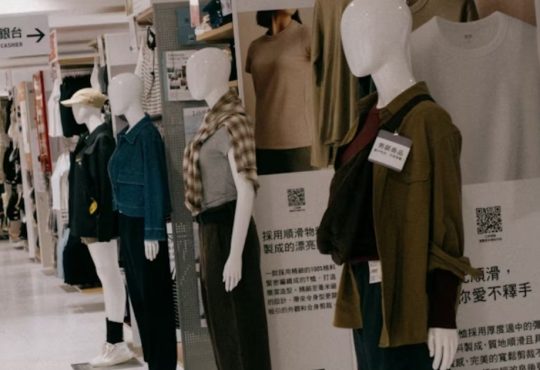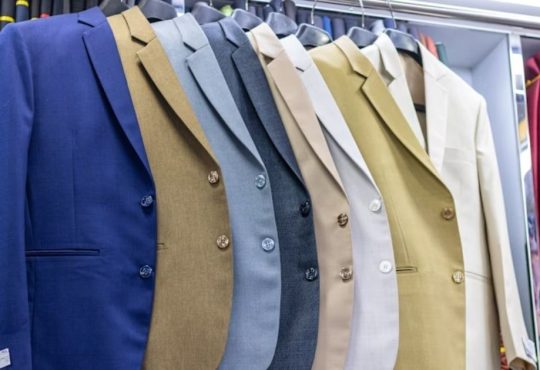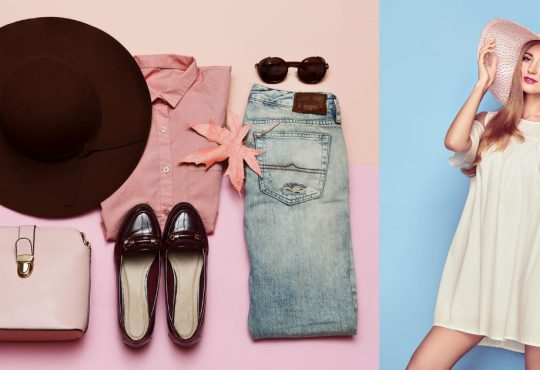Sustainable fashion is gaining momentum as consumers become more conscious of the industry’s environmental and ethical impacts. Luxury and everyday brands are stepping up, implementing eco-friendly practices to reduce their carbon footprint, minimize waste, and support fair labor. This curated list highlights top brands prioritizing sustainability, offering consumers stylish alternatives without compromising the planet’s future.
From organic fabrics and eco-friendly production processes to ethical sourcing and cruelty-free innovations, these sustainable fashion brands embody a shift toward responsible fashion. Each company on this list is a pioneer in their own right, blending sustainability with luxury, comfort, and style. Emphasizing durability over fast trends, they prove that conscious choices in fashion can be both beautiful and beneficial to the world.
1. Stella McCartney
Stella McCartney pioneers sustainable luxury, setting a high standard in eco-friendly fashion. The brand minimizes its environmental footprint using organic cotton, recycled polyester, and regenerated nylon. Innovating beyond conventional materials, Stella McCartney incorporates vegan leather derived from mushroom and grape byproducts, reducing dependence on animal-based products and plastics. These practices align with the brand’s vision of merging high fashion with environmental consciousness, making it a leader in the sustainable fashion movement.
Beyond materials, Stella McCartney promotes cruelty-free and ethical practices throughout its supply chain. Collaborations with sustainable textile innovators have further strengthened the brand’s position in the industry. Each collection reflects a seamless blend of timeless style and cutting-edge sustainability, demonstrating how fashion can evolve responsibly.
2. Naadam
Naadam focuses on redefining luxury cashmere by prioritizing ethical sourcing and sustainable practices. Collaborating directly with Mongolian herders, the brand ensures fair wages and humane treatment of animals, setting an example in ethical production. Using eco-friendly methods, such as minimizing water usage and eliminating harmful chemicals, ensures a lower environmental impact while preserving the cashmere’s exceptional quality.
A transparent supply chain is at the heart of Naadam’s operations, giving consumers insight into the origins of their garments. The brand’s durable and high-quality products encourage mindful consumption, promoting investment in pieces designed to last. Naadam exemplifies how sustainability and ethical responsibility can coexist with luxury fashion.
3. Maria McManus
Maria McManus exemplifies timeless fashion with an emphasis on sustainability and quality craftsmanship. The brand uses eco-conscious materials such as organic cotton, recycled fabrics, and biodegradable textiles to create versatile, stylish garments. Ethical production processes reduce waste, supporting a circular approach to fashion and discouraging disposable trends.
The brand’s philosophy focuses on creating enduring wardrobe staples, encouraging consumers to embrace fewer but better-quality items. Each piece is thoughtfully designed to align with sustainable principles, blending modern aesthetics with environmental awareness and redefining how fashion intersects with conscious living.
4. Gabriela Hearst
Gabriela Hearst reimagines luxury fashion with an unwavering commitment to sustainability and ethical sourcing. By utilizing natural, responsibly sourced materials such as alpaca, linen, and silk, the brand ensures its products embody sophistication without sacrificing sustainability. Gabriela Hearst’s collections are designed with longevity in mind, promoting a “buy less, choose well” philosophy to reduce overconsumption.
The brand also emphasizes a transparent supply chain, fosters partnerships with artisans, and supports fair labor practices. Gabriela Hearst’s dedication to sustainability and its elegant and timeless designs solidify its place as a trailblazer in eco-conscious luxury fashion.
5. Mfpen
Mfpen redefines fashion by transforming deadstock and surplus fabrics into contemporary, high-quality garments. The brand sources unused materials from European mills, primarily in Italy and Portugal, effectively reducing textile waste and environmental impact. Its knitwear and jersey collections further exemplify sustainability, using recycled fibers such as pre-and post-consumer wool, cashmere, and polyester.
The commitment to sustainability extends to every detail, ensuring no new fabrics are produced by offering stylish yet responsibly crafted pieces—mfpen challenges traditional fashion norms, presenting a thoughtful and innovative approach to modern dressing.
6. Bethany Williams
Bethany Williams combines art, fashion, and social responsibility to create impactful designs. Known for using recycled, deadstock, and organic materials, the brand prioritizes sustainable practices while collaborating with social projects and local manufacturers in the UK and Italy. Each collection highlights the interconnectedness of environmental and social issues, blending creative innovation with conscious fashion.
Bethany Williams’ commitment to ethical practices has earned widespread recognition, including the Queen Elizabeth II Award for British Design. The brand’s focus on community-driven initiatives and sustainable design sets a benchmark for the fashion industry, proving that creativity can drive positive change.
7. Bogdar
Bogdar blends bold design with sustainable practices, crafting statement partywear pieces that stand out. The brand operates a family-owned atelier in Bulgaria, ensuring meticulous attention to detail and high-quality craftsmanship. Using sustainable and eco-friendly materials, Bogdar combines the glamour of nightlife with a commitment to responsible fashion.
The collection caters to individuals seeking unique, high-impact designs without compromising sustainability. Each piece reflects the brand’s dedication to thoughtful production, making Bogdar stand out for ethically conscious partywear enthusiasts.
8. Bleusalt
Bleusalt creates luxurious basics using some of the softest, most sustainable fibers available, all produced in the United States. The brand’s versatile, seasonless pieces promote a timeless aesthetic, offering wardrobe staples designed for long-term use. With a commitment to reducing waste and minimizing environmental impact, Bleusalt’s approach aligns style with responsibility.
The brand emphasizes quality and durability, encouraging consumers to invest in pieces that transcend trends. Bleusalt exemplifies how sustainable practices can seamlessly integrate into everyday fashion, redefining luxury essentials for a conscious audience.
9. House of Dagmar
House of Dagmar celebrates Scandinavian design and sustainability, offering elegant women’s fashion crafted from eco-friendly materials. The brand emphasizes durability and timelessness, creating pieces that reflect its commitment to environmental responsibility. Its collections are produced by trusted manufacturers, ensuring ethical practices throughout the supply chain.
Founded by three sisters in honor of their grandmother, a skilled tailor, House of Dagmar carries a legacy of craftsmanship and quality. The brand’s sophisticated and minimalist aesthetic resonates with modern consumers, embodying a blend of tradition and innovation in sustainable luxury fashion.
10. Stine Goya
Stine Goya challenges minimalist fashion norms with vibrant colors, unique prints, and timeless designs. Each collection uses high-quality, sustainably sourced fabrics, ensuring ethical practices from production to the final product. Stine Goya’s in-house team focuses on creating wearable pieces that empower individuals to express themselves confidently.
The brand has grown significantly since its founding, expanding internationally while maintaining its commitment to sustainability. Stine Goya stands out for its bold approach to fashion, blending creativity with conscious practices to redefine modern style.
11. Omnes
Omnes offers stylish, sustainable fashion by prioritizing transparency and ethical practices. Partnering with certified manufacturers, the brand ensures fair labor standards and responsible production methods. Its timeless designs promote longevity and reduce waste, encouraging consumers to embrace mindful consumption.
Omnes balances modern aesthetics and sustainability, empowering individuals to make environmentally conscious choices without compromising style. By blending functionality with responsible practices, the brand sets a new standard for accessible, eco-friendly fashion.
12. Mother of Pearl
Mother of Pearl combines contemporary womenswear with sustainability, creating bold, sophisticated designs. Under creative director Amy Powney, the brand emphasizes responsible sourcing, reduced environmental impact, and ethical practices. Each collection blends wit, heart, and conscience, offering pieces that stand out while aligning with sustainable values.
Mother of Pearl champions positive change in the fashion industry through innovative practices and transparency. The brand’s commitment to crafting timeless designs with a conscience makes it a leader in contemporary sustainable fashion, embodying elegance and responsibility.
Environmental Impact of Fast Fashion
- Excessive Carbon Emissions: The fashion industry produces 10% of global carbon emissions, surpassing the combined emissions of international flights and shipping. Clothing production, transportation, and disposal release significant greenhouse gases. This cycle worsens climate change, driven by the fast-paced demand for new trends.
- Growing Landfill Crisis: Discarded clothing contributes to 92 million tons of global textile waste annually, incinerating much of it and releasing harmful pollutants. On average, individuals throw away 70 pounds of clothing yearly, adding immense pressure to landfills. Fast fashion’s focus on short-term trends fuels this unsustainable waste cycle.
- Water Consumption and Pollution: A single cotton shirt requires 2,700 liters of water, and the industry generates 20% of global wastewater. Toxic chemicals from dyeing textiles pollute waterways, harming aquatic ecosystems and local communities. Water consumption and contamination highlight the industry’s environmental toll.
- Labour Exploitation in Sweatshops: Sweatshops employ workers in unsafe conditions, with extended hours and minimal wages. The drive for cheap production highlights ethical concerns as workers struggle to meet basic needs. These exploitative practices show the human cost behind fast fashion’s affordability.
- Microplastics in Waterways: Washing synthetic fabrics releases millions of microplastic fibers into waterways, polluting rivers, lakes, and oceans. Polyester, nylon, and acrylic are major contributors to this contamination. Microplastics disrupt ecosystems and enter the food chain, impacting marine life and human health.
The Path Forward for Fashion Sustainability
The future of fashion balances style, functionality, and sustainability. As awareness of fast fashion’s environmental and social costs continues to rise, more brands are embracing eco-conscious practices, redefining luxury and ethical production. By supporting these brands, consumers can be part of a growing movement towards a more responsible and sustainable fashion industry.
Choosing brands prioritizing sustainability is about making a positive environmental impact and empowering change in a notoriously wasteful industry. With continued innovation and commitment to eco-friendly practices, the future of fashion will look more stylish and sustainable, creating a lasting change for generations to come.





